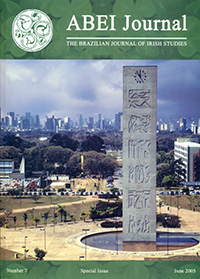The Hindu Celticism of James Cousins (1873-1956)
DOI:
https://doi.org/10.37389/abei.v7i1.184280Palabras clave:
James Cousins, Hindu , CelticismResumen
The very existence of James Cousins as a significant Irish Cultural Revival voice is barely acknowledged in the field of Irish Studies. Alan Denson’s pioneering and admittedly congested bio-bibliographical survey published in 1967 has made very little difference in the many commentaries on the Irish Revival in which Cousins was imaginatively formed and from which he emerged as a great teacher in India. Very recently, the young American scholar Joseph Lennon has devoted a very welcome long chapter on Cousins in his book Irish Orientalism wherein Cousins is seriously discussed in the light of issues arising out of the implications of Edward Said’s seminal post-colonial work Orientalism. The essay which follows will attempt to track the passage of Cousins from Ireland to India where finally the veteran Celticist was admitted to Hindu worship on January 14 1935 in the temple of Travancore in South India. The cross-cultural significance of the spiritual formation of Cousins as Hindu Celt will be discussed in the light of certain key texts which he wrote along the way – plays, poems, theosophical writings, autobiographical musings and educational philosophising. This considerable legacy of writings, which Tagore felt deserved the Nobel Prize for Literature in 1934, awaits discovery by a new generation of Irish cultural commentators.
Referencias
Campbell, Joseph & Bill Myers. The Power of Myth. Toronto: Doubleday. 1989.
Chatterjee, D.K. James Cousins: a Study of his Works in the Light of the Theosophical Movement in India and the West. Delhi: SCT, 1994.
Clifford, James. “Diaspora”. Routes: Travel and Translation in the Late Twentieth Century. Harvard: University Press, 1997. 244-77.
Cousins, James H. “The Racing Lug” first published in United Irishman 8 n. 175. 5 July, 1902.
Reprinted in Lost Plays of the Irish Renaissance. Eds. Hogan, Robert & James Kilroy. California: Proscenium Press, 1970.
____.The Wisdom of the West. London: Theosophical Publishing Company, 1912.
____.The Renaissance in India. Madras: Ganesh & Co, 1918.
____.The King’s Wife. Madras: Ganesh & Co, 1919.
Descargas
Publicado
Número
Sección
Licencia
Derechos de autor 2005 Jerry Nolan

Esta obra está bajo una licencia internacional Creative Commons Atribución-NoComercial 4.0.


